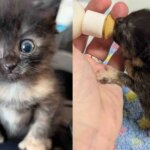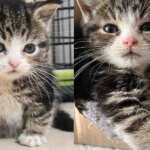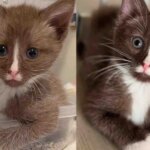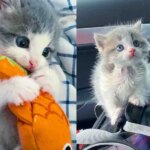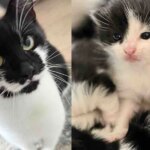Are you wondering if your kitten or cats drink milk? While it may seem like a natural and harmless choice, the reality is that many cats are actually lactose intolerant. This means that their bodies cannot properly digest lactose, the sugar found in milk.
As a responsible pet owner, it’s important to understand the risks associated with feeding your feline friend dairy products. In this article, we’ll explore whether cats can drink milk and what alternatives to consider if they cannot.
We’ll also discuss how much milk is safe for cats to consume and what signs of intolerance to watch out for. So before you pour that saucer of milk for your kitty, read on to learn more about their nutritional needs and digestive limitations.
Cats and Lactose Intolerance
You shouldn’t give your cat milk, as they can’t digest lactose due to their natural intolerance. Lactose is a type of sugar present in dairy products, and cats lack the enzyme lactase that helps break down lactose into smaller molecules for digestion. As a result, feeding your cat milk or other dairy products can cause diarrhea, vomiting, and abdominal pain.
If you’re concerned about providing proper kitten nutrition without using milk or dairy products, there are plenty of lactose-free options available. Commercial cat foods formulated for kittens contain all the necessary nutrients for growth and development. Additionally, there are specialized formulas available that mimic the nutritional content of mother’s milk with added vitamins and minerals.
So while it may seem cute to offer your furry friend a saucer of milk like in cartoons, it’s best to avoid giving them any dairy products altogether. Instead, opt for specially formulated kitten food or seek advice from your veterinarian regarding alternative sources of nutrition.
Now let’s explore whether cats can drink milk at all.
Can Cats Drink Milk?
Ah, the beloved creamy white beverage – it’s a common misconception that our feline friends can consume it without any issues. While cats may enjoy the taste of milk, they are lactose intolerant, which means they can’t properly digest lactose found in dairy milk. This can result in upset stomachs and diarrhea.
Fortunately, there are milk alternatives available for cats that are safe to consume. These include specially formulated cat milk and lactose-free cow’s milk. It’s important to note that while these alternatives may be suitable for some cats, they shouldn’t be relied upon as a primary source of nutrition as they don’t provide all the necessary nutrients needed for a balanced diet.
Overall, while cats can technically drink milk alternatives without adverse effects, it’s important to remember that regular dairy milk should be avoided due to their lactose intolerance.
In the next section, we’ll discuss the risks of consuming dairy milk and what health issues it can cause for our feline companions.
The Risks of Milk for Cats
When it comes to our furry friends, dairy milk may seem like a tempting treat, but it’s important to remember that it can be a wolf in sheep’s clothing, causing digestive issues and potentially even leading them down a dangerous path.
Cats are generally lactose intolerant, which means their bodies can’t break down lactose – the sugar found in dairy products – as easily as humans can. This leads to various milk allergy symptoms such as vomiting, diarrhea, and abdominal pain.
If you notice your cat experiencing any of these symptoms after consuming milk or other dairy products, it’s best to avoid giving them these items altogether. Instead, opt for dairy-free cat treats that are specifically formulated for cats’ nutritional needs. These treats provide the same level of satisfaction without the risk of digestive issues that come with traditional dairy products.
In addition to reducing the risk of digestive problems in cats, switching to dairy-free treats also provides peace of mind for pet owners who want to ensure their pets receive the best possible nutrition.
Now that you know about the risks associated with milk for cats and have alternatives available, let’s explore some other options for making sure your cat stays healthy and happy!
Alternatives to Milk for Cats
Looking for a creamy and satisfying treat to give your feline friend? Try offering them a small spoonful of plain yogurt instead of milk. Not only is it safe for cats to consume, but it can also provide beneficial probiotics for their digestive system.
Additionally, you can try plant-based alternatives such as unsweetened almond milk or coconut milk, which are lactose-free and do not contain the natural sugars found in cow’s milk that may upset your cat’s stomach.
If you want to make your own homemade cat ‘milk,’ mix together water and canned tuna (in water) or chicken broth, then blend until smooth. This mixture provides a similar texture and flavor as cow’s milk without any harmful effects on your cat’s health.
It’s important to note that while these alternatives are safe in moderation, they should not replace water as the primary source of hydration for your cat. In the next section, we’ll discuss how much milk is appropriate for cats to consume per day.
How Much Milk Can Cats Drink?
To determine the appropriate amount of dairy for your furry friend’s diet, you should consult with your veterinarian. Milk consumption for cats does provide some nutritional value, but it is important to keep in mind that too much milk can lead to health issues.
While kittens may benefit from milk during their early stages, adult cats may not require as much. Milk contains lactose, a type of sugar that many adult cats have trouble digesting. When consumed in large quantities, lactose can cause gastrointestinal distress such as diarrhea or vomiting.
It is recommended that you limit your cat’s milk intake and opt for alternative sources of nutrition instead. When it comes to feeding your cat milk, moderation is key. Giving your feline companion a small amount of milk as an occasional treat should not be harmful.
However, if you notice any signs of discomfort or digestive issues after giving them dairy products, it may be best to avoid giving them any more milk altogether. In the next section we will explore specific signs of milk intolerance in cats and what to do if these symptoms arise.
Signs of Milk Intolerance in Cats
If you’re considering sharing some dairy with your furry friend, it’s important to know that up to 50% of adult cats may be lactose intolerant. This is because most cats lose the ability to break down lactose, a sugar found in milk, as they age. As a result, giving them milk can lead to digestive issues and milk intolerance symptoms.
One of the primary signs of milk intolerance in cats is diarrhea. The undigested lactose pulls water into the intestines, resulting in loose stools. Additionally, vomiting and abdominal pain are also common symptoms. If your cat experiences any of these symptoms after consuming dairy products like milk or cheese, it’s best to avoid feeding them these items altogether.
While kittens can tolerate small amounts of milk when they’re young and still nursing from their mother, adult cats should not consume dairy products regularly or at all due to their high chances of being lactose intolerant. If you do decide to give your cat some dairy as an occasional treat, make sure you monitor their behavior for any signs of digestive issues or milk intolerance symptoms such as diarrhea and vomiting.
Conclusion
Congratulations! You now know the answer to the age-old question: can cats drink milk?
While it may seem like a harmless treat, milk can actually cause digestive issues for many cats due to their lactose intolerance. However, there are alternatives such as lactose-free milk or water that can be just as satisfying for your feline friend.
But let me leave you with this metaphor: giving your cat milk is like giving a child candy. It may bring temporary joy, but in the long run it can lead to health problems and discomfort.
So next time you’re tempted to give your kitty a saucer of milk, remember that there are better options out there for their well-being. Your furry companion will thank you for it!
Read more:








